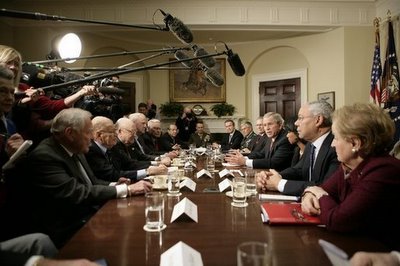Can We Discuss This?
 Can I discuss the use of the word "discuss" on the White House website? Did the Unitary Executive make a New Year's resolution to seem less omnipotent?
Can I discuss the use of the word "discuss" on the White House website? Did the Unitary Executive make a New Year's resolution to seem less omnipotent?For example, on the morning of January13th, website headlines included "President Visits Mississippi, Discusses Gulf Coast Reconstruction," "President Participates in Discussion on the Global War on Terror," and "Iraqi Police Force Discussed." By afternoon the headlines included "President Discusses Central American Relief and Reconstruction Efforts." In "Ask the White House," the text was topped with "Discuss the National Archives." (Of course, I felt compelled to submit a question.)
Compared to the words that newspapers use to describe the rhetorical work of policy makers -- "defends," "contradicts," "debates," "declares," etc. -- "discusses" is a milksop word. It's about the appearance of rhetorical exchange rather than the actual activity of it.
Perhaps it is analogous to bringing in all the living past and present Secretaries of State and Defense into the White House on January 5th to pose listening to their "concerns" before the real work of the actual photo opportunity could start.
Labels: government websites, institutional rhetoric, White House

2 Comments:
I will listen differently to public discourse having heard your account of the currency of "discussion" in Bush's rhetoric. I prefer the word "deliberative," which I borrow from Habermas. He describes deliberative democracy (which he opposes to both liberal and republican forms of democracy) as the set of procedures required when a pluralistic society is composed of groups whose interests will never be fully reconciled, and who therefore need mechanisms of compromise. "The political interests and values that stand in conflict with each other without prospects of consensus are in need of a balancing that cannot be achieved through ethical discourses -- even if the outcomes of bargaining processes are subject to the proviso that they must not violate a culture's agreed-upon basic values." "Discussion" as you retrieve it from the contemporary scene is not deliberative in Habermas' sense. It does not involve the actual brokerng of differences among distinct parties. Discussion is the pure appearance of deliberation, without substance. (See "Three Normative Models of Democracy," Democracy and Difference, ed. Seyla Benhabib, p. 25.)
It's interesting that you mention Habermas, because he has been an important influence on my thinking about digital rhetoric. The example from Habermas of the kind of bargaining you describe that I always think of is in his story about construction workers ordering out for beer. I love it because it shows how important attention to the ethical dimensions of everyday forms of communicative action can be. As a German-American, I also love it because it is so stereotypically German! Construction workers! Beer!
Post a Comment
<< Home